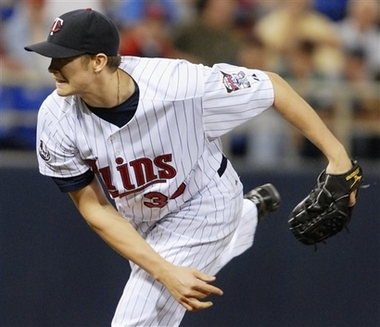March 8, 2009
Extending Baker
For the Twins the risk is shelling out $15.25 million in guaranteed money when they could have gone year-to-year with Baker via arbitration. If he suffers a major injury or sees his performance decline the Twins will have prepaid for something that is no longer as valuable. Back in 2002 the Twins inked Joe Mays to a very similar four-year contract with a fifth-year team option that locked in his salaries during arbitration eligibility and then gave the Twins a chance to buy out his first season of free agency.
At the time Mays was 26 years old and coming off a season in which he made the All-Star team while winning 17 games with a 3.16 ERA, but he was injured and ineffective over the next four years and the Twins ended up paying $20 million for him to go 18-26 with a 5.81 ERA. There's no reason to think that Baker will follow in Mays' footsteps, but you don't have to look very far back into Twins history to see an example of why not all deals like this one are win-win situations and pitchers are always health risks.
 Of course, along with that Mays-like risk Baker's contract also contains plenty of potential reward for the Twins as well. If he remains healthy and effective Baker likely would've earned considerably more than $15 million over the next four seasons, saving the Twins money during his arbitration eligibility. Beyond that, the option to delay his free agency for one season at the cost of $9.25 million has a chance to be a major bargain come 2013.
Of course, along with that Mays-like risk Baker's contract also contains plenty of potential reward for the Twins as well. If he remains healthy and effective Baker likely would've earned considerably more than $15 million over the next four seasons, saving the Twins money during his arbitration eligibility. Beyond that, the option to delay his free agency for one season at the cost of $9.25 million has a chance to be a major bargain come 2013.
Meanwhile, the risk-reward comparison for Baker is somewhat similar. He trades in significant earning potential over the next five seasons for $15.25 million in guaranteed money that makes him a rich man whether he goes on to pitch another dozen seasons or blows out his elbow on Opening Day. Because of that the only real risk for Baker is not maximizing his earning potential and the reward is not having to worry about money ever again, so it makes for a pretty easy decision:
I don't think in any way I'll ever regret this decision, whether I have great seasons or average seasons. It was kind of a no-brainer. This is a place I enjoy being. My family loves Minneapolis. If you can't play for [manager Ron Gardenhire] then something's wrong with you, and I work well with [pitching coach Rick Anderson], so I like what's going on here, and this is where I wanted to be.
For the Twins the risk is potentially having to pay $15.25 million for an injured pitcher versus the reward of keeping him in Minnesota for an extra year at discount rates if Baker remains healthy. While not quite the no-brainer decision that the contract represented to Baker, the Twins have done well to lock up one of their best players through the age of 31. Barring a Mays-like collapse for Baker, the agreement gives both sides a chance to look back on the contract with no regrets.
Baker will earn $750,000 this season, $3 million in 2010, $5 million in 2011, and $6.5 million in 2012. The team option for 2013 is somewhat unusual in that it doesn't come with a buyout attached, so the Twins can choose between paying him $9.25 million or cutting him loose without a penalty. In terms of market value, the Baker deal is nearly identical to the contract the Pirates recently handed to their own 27-year-old Opening Day starter, Paul Maholm, who posted a 3.71 ERA in 206.1 innings last season.
Between a demotion to Triple-A two seasons into his big-league career and Bert Blyleven's incessant spewing of the then-company line about "not keeping the ball down" Baker has had to overcome quite a bit to establish himself as the solid major-league pitcher that his minor-league track record always predicted. While not a prototypical ace starter, Baker will take the mound on Opening Day after posting Fielding Independent Pitching (FIP) marks of 3.79 last season, 3.89 in 2007, and 4.05 for his career.
To put those FIP numbers into some context, consider that over the past five seasons there have been an average of 33 major-league starters with a FIP under 4.00. That makes Baker either a low-end No. 1 starter or a top-notch No. 2 starter, assuming he continues to pitch at roughly the same level. Since returning from Triple-A to rejoin the rotation in mid-2007 he's gone 20-13 with a 3.82 ERA in 51 starts, posting a fantastic 243-to-71 strikeout-to-walk ratio in 316 innings. And now he's around through 2013.

